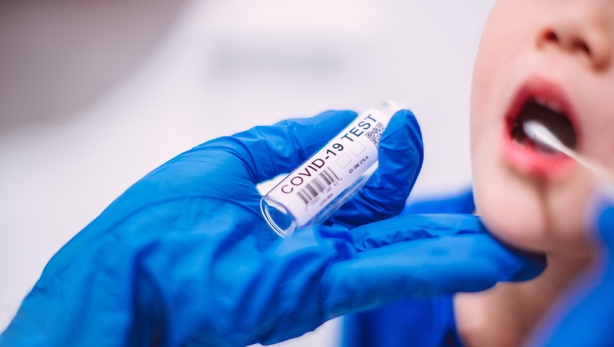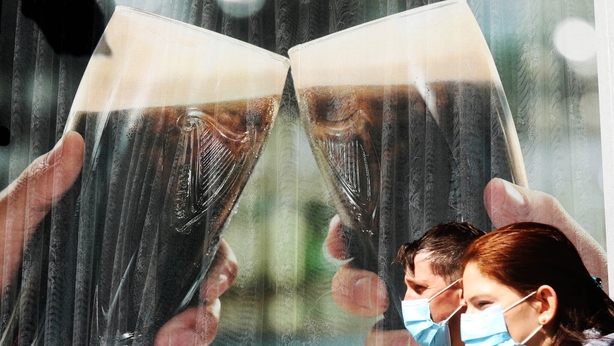There has been a significant increase in the number of Covid-19 cases reported by the Department of Health, after a further 307 cases have been confirmed in the past 24 hours.
There has been one more death reported.
The cumulative total number of cases in Ireland is 30,080 with 1,778 deaths.
It is the highest daily increase in cases reported since mid-May.
More than half of the new cases are in Dublin, with 182 reported. Community transmission is associated with 44 of those cases.
Of the case notified today 160 are men and 146 are women, with 73% are under the age of 45.
Acting Chief Medical Officer Dr Ronan Glynn has said it was not the time for anyone to let their guard down, urging people to "assume that you or those that you meet may be infectious and act accordingly".
He said: "Do not underestimate the risks associated with any of your interactions, including with your family, friends or work colleagues."
He urged everyone to follow public health advice and to keep their distance.
Overall, 64% of cases are confirmed to be associated with outbreaks or are close contacts of a confirmed case, while 72 cases have been identified as community transmission.
There were 25 cases in Kildare, with 19 in Limerick, 15 each in Wexford and Louth, eight in Wicklow, and six each in Galway, Clare and Kilkenny.
The remaining 25 cases are located in Cavan, Cork, Donegal, Kerry, Longford, Meath, Monaghan, Offaly, Sligo, Tipperary, Waterford, Westmeath.
We need your consent to load this rte-player contentWe use rte-player to manage extra content that can set cookies on your device and collect data about your activity. Please review their details and accept them to load the content.Manage Preferences
The Chief Clinical Officer at the Health Service Executive has said there are no plans "at this point in time" to introduce localised restrictions in Dublin and Limerick.
Dr Colm Henry said that despite the recent rise in cases of Covid-19 in the two counties, it is too early to consider the measures that were implemented in Kildare, Laois and Offaly.
Speaking on RTÉ's Prime Time, he said: "The more extreme measures don't have to happen if people rally together, if they limit the number of contacts, avoid congregated settings, and break that chain of transmission from household to household.
"Nobody wants to go back to lockdown."
However, Dr Henry added that there is great uncertainty about the coming months, and that it will be "a case in some areas, in some counties, of two steps forward and one step back."
Infectious Diseases Consultant at St Vincent's Hospital in Dublin Professor Paddy Mallon said lockdowns can "really only be seen as a setback, because of the impact on personal freedoms and the impact it has economically".
He believes a continued focus on the testing and tracing system is the solution.
"The more lockdowns that we see, the less viable the 'living with the virus' strategy becomes".
Professor Anthony Staines of DCU's School of Nursing said talk of more lockdowns is premature.
He said: "Every time the virus goes up, the local economy takes a nose-dive, and that is what we have to prevent.
"We need to get ahead of this virus and stop reacting to it all the time".

The World Health Organisation's Special Envoy on Covid-19 has urged people in Ireland to maintain discipline in relation to Covid-19, as when the numbers in intensive care go down towards zero, "that's when you're at your most vulnerable".
Speaking on RTÉ's Drivetime, David Nabarro said "the absolute challenge when you're trying to control an infectious disease is when you get down to near zero numbers."
He said "this is the most dangerous time of all, this is when you let your guard down, and before you know it, quick as a flash, it's back again".
In relation to travel, Dr Nabarro said he'd like non-essential travel to resume, but he'd like to see every possible precaution during the travel experience to reduce the likelihood of spreading the disease.
Dr Nabarro said he does not expect a vaccine to be ready for administration until well into next year.
Call for breakdown of cases
Social Democrats co-leader Róisín Shortall has called for a detailed breakdown of the 307 cases and said the Taoiseach needs to make a statement on the matter.
There should be daily reports on where testing is taking place and what the results are, she said.
"If detail is available on where the cases are, the places of transmission and how transmission has taken place, that helps to inform the public", she said.
"It's important that a full picture is provided to people so they can adjust their behaviour and actions in line with that".
Parishioners urged to give good example
The Archbishop of Dublin has said that while in his experience, parishes have been scrupulous in respecting current norms, he has stressed the importance of parishes and Churches giving a good example.
Diarmuid Martin has called on parishioners to strictly observe all hygiene measures, before and after liturgical ceremonies, and has issued an "urgent appeal" following the increase in cases this evening.
There are "indications" that social distancing in some cases have "become loose", he said.
In a statement he notes that public health authorities have contacted several bishops concerned about breaches of social distancing.
He says photos have been published on parish websites indicating poor practice.
Ireland falls behind UK on incidence rate
The incidence of Covid-19 cases in Ireland over the past 14 days has reduced, according to the ECDC.
The ECDC says that there have been 33.8 cases for every 100,000 people in Ireland in the last fortnight. Yesterday it was at 34.7.
Ireland has also dropped behind the UK on the incidence rate.
The comparable figure today for the UK is 35.2.
Spain has the highest rate with 255.9 cases for every 100,000 people. Italy is on 30.6 and Germany on 21.
Earlier the Department of Health in Northern Ireland reported two deaths associated with Covid-19 and 40 new cases.
It brings the total number of deaths in Northern Ireland to 567, while there have now been 7,908 confirmed cases.

The Cabinet has agreed that pubs that do not serve food will be able to reopen from 21 September, it is understood.
However, a group of publicans who gathered outside Leinster House said this is the fourth date they have been given to reopen and do not trust that it will happen.
The reopening will be subject to local restrictions that may arise from time to time, with indications that public health advice could impact on plans to reopen pubs in Dublin and Limerick.
Separately the Irish Medical Organisation has reported a surge in the number of children attending GPs for assessment for possible Covid-19.
It said that the increase is being experienced across the country.

